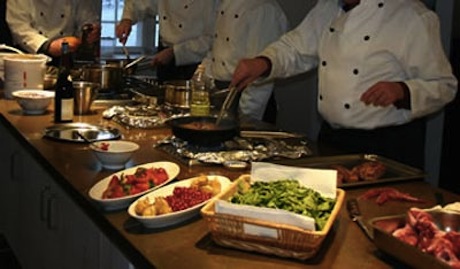(单词翻译:单击)
情景对话
Todd: OK, Rebecca we're talking about working in a restaurant. Now you became a chef. Can you talk about the process of becoming a chef? What do you do to get a job in a kitchen?
托德:丽贝卡,我们来谈一下在厨房工作的事情。你是一名厨师。你能说说成为厨师的过程吗?你是怎么得到厨房的工作的?
Rebecca: Well, there's lots of different ways, but the most common way is to become an apprentice which means you go to the kitchen and work at the bottom level doing the basic chopping — boring jobs — for maybe two or three years, and then one day a week you go to school, a cooking school. Your employer pays for you to go to the school. You do get paid by your employer but it's a really small wage, so, yeah. Otherwise, you can start at the bottom, like a dishwasher, and actually Australia's most famous chef started that way. He just was a dishwasher and he slowly climbed up the ladder, so you can do it that way as well.
丽贝卡:有很多种不同的方法,最普遍的做法是先当学徒,你要先去厨房里从底层开始做起,做一些简单的切菜之类的无聊工作,这项工作可能要做两三年的时间,然后每周有一天去上烹饪学校上课。你的雇主会支付去你烹饪学校的费用。在这段时间里,虽然你也有工资,不过非常少。还有一种方法,你可以从洗碗工这种底层工作开始做起,实际上澳大利亚最著名的厨师就是从洗碗工开始做起的。他从洗碗工开始,一步步往上升,所以也可以用这种方法。
Todd: So what about you? Did you go to cooking school?
托德:那你呢?你也上过烹饪学校吗?
Rebecca: Yeah, I did, but actually I dropped out after awhile, so I did that for about a year but to be honest I think you get more experience in a kitchen. Sometimes the stuff they teach you at school is a little bit old-fashioned.
丽贝卡:对,上过,不过我只上了一段时间就退学了,我大概学了一年的时间,不过说实话,我觉得在厨房里工作能积累更多经验。有时你在学校里学的东西会有点过时。
Todd: How much actually of what you learn do you just learn on yourself, as just a creative process? Like how much do you think you learn by watching others and how much do you learn on your own, using your own creativity?
托德:你基本上是自学吗,就是那种创新的过程?你通过观看他人来学习占了多少比重?你用自己的创造力自学又占了多大比重?
Rebecca: I think both are really important. Actually, I learned a lot from my mother. When I was a kid, I used to watch her cooking all the time, and it wasn't until I grew up that I realized how much I understood about cooking just from seeing what she did in the kitchen, but also talking about how to do things with your colleagues I think is really important.
丽贝卡:我觉得这两种方法都很重要。实际上,我从我妈妈那里学到了很多。我小时候经常会在一旁看我妈妈做饭,直到我长大以后我才意识到我只是看她在厨房做饭就学到了很多烹饪技巧,我认为如何和同事相处也非常重要。
Todd: Now, I'm curious, you know how to cook, and everybody knows you know how to cook — family members and friends — so how... do you like to actually cook for family members and friends or is cooking a job that when you go home, you prefer not to cook for other people because it's like bringing your work home?
托德:我好奇的是,你知道如何烹饪,你的家人和朋友都知道你会做饭,那你喜欢为家人和朋友做东西吃吗?还是你只把烹饪当作工作,回家以后你不想再给其他人做饭吃,因为会有种把工作带回家的感觉?
Rebecca: Well, I know some chefs that have nothing in their fridge and they hate cooking at home, but I'm not like that. I really love cooking for people. It's really the nicest thing you can do for someone is to give them a lovely meal. The sad thing is actually that no one will ever cook for me, because they're too scared. They always apologize before I even have a chance to eat it. "Oh, it's going to be terrible. Oh, you're a cook. I'm sorry." But actually I love food being cooked for me. I wish people would do it more.
丽贝卡:嗯,我知道有些厨师自己的冰箱里什么都没有,他们讨厌在家做饭,不过我不是这样。我非常喜欢给人们做饭吃。我认为对别人做的最好的事情就是给他们准备一顿美餐。不过令人难过的是没有人给我做饭吃,因为他们会担心。通常在我尝味道之前,他们就已经先道歉了。“哦,这肯定不好吃。你是厨师,我很抱歉。” 实际上我喜欢别人为我做饭吃。我希望他们能多这样做。
Todd: OK. That's funny. Thanks Rebecca.
托德:好。这很有趣,谢谢你,丽贝卡。

译文属可可原创,仅供学习交流使用,未经许可请勿转载
重点讲解
重点讲解:
1. as well 也;还;
例句:I write my own songs and I play the guitar as well.
我唱自己谱曲的歌,也弹吉他。
2. what about (用于引出与之前内容相关的新的话题或观点)那么…怎么样;
例句:You will feel fine. But what about him?
你自然很高兴,可是对方如何呢?
3. drop out 退学;退出(比赛等);
例句:In any year some of the students on this crash course find the pace too hot for them and drop out before Christmas.
每年都有一些修这门速成课的学生觉得课程负担太重而于圣诞节前辍学。
4. to be honest 老实说;说实在的;
例句:To be honest, I knew very little about Western culture.
说老实话,我对西方文化所知甚少。
5. on one's own 独立地;依靠自己地;
例句:He can be left to work on his own.
工作可交给他一个人去做。
6. used to do sth. 过去常常;过去曾;
例句:He used to smoke a pack of cigarette a day.
他过去经常一天抽一包香烟。


